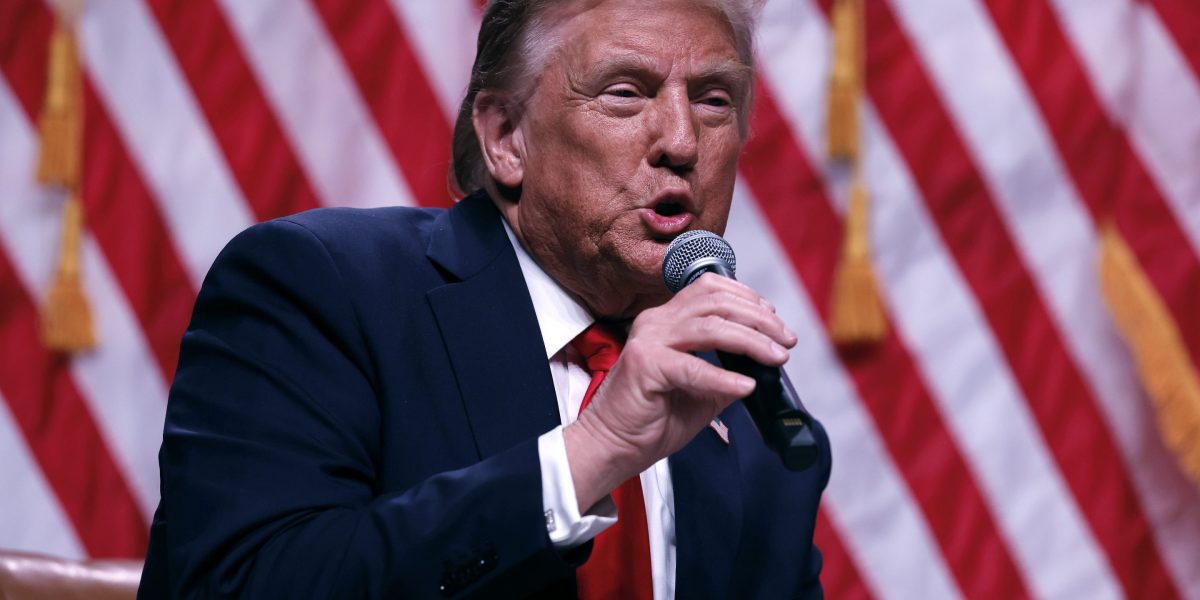Futures for the Dow Jones Industrial Average and S&P 500 ticked up 0.1%, while Nasdaq futures were essentially flat.
Deep red Kentucky was called for Donald Trump, and deep blue Vermont was called for Kamala Harris as polls in those states closed. Polls in swing state Georgia also closed but it will be a while before it’s clear who the winner is there.
During the regular session, the Dow closed up more than 400 points, or 1%, at 42,221.88. The S&P 500 rallied 1.2% to finish at 5,782.76, and the Nasdaq shot up 1.4% to 18,439.17.
Most components of the so-called Trump trade continued to weaken after retreating on Monday. The greenback fell again on Tuesday, with the U.S. Dollar Index down 0.4%. The 10-year Treasury yield eased 2 basis points to 4.29%, but Bitcoin rose 3%.
Those assets have followed Trump’s political prospects because his tariffs, tax cuts, and immigration crackdown are seen as inflationary, limiting the Federal Reserve’s ability to lower rates further, while he has also rebranded himself as a champion of the crypto sector.
Meanwhile, shares of Trump Media and Technology closed down 1.2% after giving up big gains earlier in the day amid volatile trading.
Overseas markets eyed the U.S. election’s final hours cautiously as the next president could have a major impact on the global economy, particularly on trade. Trump has vowed to hike tariffs across the board, with duties on China especially poised to soar. And on Monday, he threatened to impose a 25% tariff on imports from Mexico unless it closed its border with the U.S.—and boost it as high as 100% if it didn’t comply.
In China, the CSI 300 Index rallied 2.5%, and Shanghai’s SSE Composite Index gained 2.3%. In Japan, the Nikkei 225 added 1.1%, and the Topix rose 0.8%. In Europe, the Stoxx 50 ticked up 0.4% while the Stoxx Europe 600 eked out a gain of less than 0.1%.
If vote tallies are disputed or delayed for an extended period, that could leave markets in limbo. Other races are critical too, as the party that controls Congress will also determine how much leeway the next president has to enact policies. Separately, the Fed wraps up its policy meeting on Thursday, with rates expected to come down 25 basis points.
Trump economy vs. Harris economy
Under another Trump administration, investors expect less regulation from the federal government. That should boost bank stocks, cryptocurrencies and crypto stocks like Coinbase, as well as companies in the oil and gas sector.
He has also threatened to roll back President Joe Biden’s signature policies, including those that encourage renewable energy and electric vehicles. Trump’s promise to curb immigration and launch a mass deportation campaign has also lifted shares of prison operators Geo Group and CoreCivic.
A Harris administration is largely seen providing more continuity with Biden’s, maintaining policies promoting green energy and infrastructure. She has also unveiled plans to encourage more housing supply, potentially benefiting homebuilder stocks.
Their differing positions on taxes will also affect corporate earnings, personal income, and stocks. Trump has promised to extend tax cuts from his first term and bring the corporate rate even lower. He has also teased a slew of eliminations, including taxes on tips, overtime pay, and Social Security payments, as well as exemptions for the military, veterans, and first responders. He has even flirted with eliminating income taxes altogether.
Harris has backed extending Trump tax cuts for Americans earning less than $400,000, but not for the richest. She also has pledged to lift the corporate rate and to force the wealthy to pay taxes on unrealized capital gains, while expanding child tax credits and giving tax breaks for small businesses.
Next president faces massive U.S. debt
Whoever the next president will be, he or she will likely face a reckoning on the soaring U.S. debt and deficits.
But that may come sooner under a Trump administration. Budget watchdogs have warned on the exploding federal deficit. While it will expand under either Trump or Harris, the Penn Wharton Budget Model and the Committee for a Responsible Federal Budget have said Trump’s policies would produce a much deeper hole. Trump ally Elon Musk has said he can cut federal spending by $2 trillion, but skeptics note that’s unlikely without gutting entitlements and the military or wrecking the economy.
Neither candidate made deficit reduction a priority during the campaign, but financial markets may force the issue. “Bond vigilantes,” or investors who protest massive deficits by selling off bonds to push yields higher, are already weighing in on the election, according to Ed Yardeni, the Wall Street veteran who coined the term in the 1980s.
As the Treasury Department auctions greater volumes of debt to finance the federal government’s ocean of red ink, bond investors may balk, sending rates higher and raising borrowing costs across key segments of the economy, like mortgage rates.
“The Bond Vigilantes may also be voting against Washington, figuring that no matter which party wins the White House and the Congress, fiscal policies will bloat the already bloated federal government budget deficit and heat up inflation,” Yardeni and colleague Eric Wallerstein wrote last month. “The next administration will face net interest outlays of over $1 trillion on the ballooning federal debt.”
Join business’s brightest minds and boldest leaders at the Fortune Global Forum, convening November 11 and 12 in New York City. Thought-provoking sessions and off-the-record discussions feature Fortune 500 CEOs, former Cabinet members and global Ambassadors, and 7x world champion Tom Brady–among many others.
See the full agenda here, or request your invitation.

